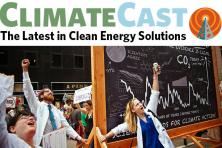Wind, sun and volcanoes too: a worldwide whirlwind of clean energy
As the world works to transition to a more renewable grid, Germany has plans to increase its onshore wind capacity by more than one gigawatt, the equivalent of one nuclear power plant. Chile is among the top ten renewable energy markets in the world, thanks to extensive investments in wind, solar and geothermal, including solar in its northern Atacama Desert, one of the sunniest places on earth, and geothermal energy at the base of its snow capped volcanoes in the South. The Netherlands is also taking its clean energy commitment to the next level by powering all airports with renewable energy starting in 2018. China has found a great way to make use of a former coal mine: by installing the world’s largest floating solar farm atop it. Here in the states, Colorado is embarking on the largest ever low-income community solar project to lower the electricity bills of low-income residents, affordable housing providers, and nonprofits.
Climate solutions
Together with coalition partners, Climate Solutions helped prevent a power company, Portland General Electric, from building a new fracked gas plant in Oregon, demonstrating the importance of public pressure and local commitments to 100% clean energy. Activism works! Earlier this month Target announced they will buy enough wind energy to power 150 stores, adding to the wind capacity for 60 stores announced last year. Stanford University researchers have made a significant climate solutions discovery, finding a way to create ethanol from mere water and CO2. All of these efforts to reduce emissions and transition to renewable sources appears to be making a difference; a new report reveals that demand for electricity in homes all across the U.S. is down from 10 years ago.
The economic opportunity (and imperative) of climate action
Climate change represents a great economic threat -- but also a great economic opportunity. When fossil fuel workers in Canada lost their jobs because of the fading oil boom, these same workers were able to find new careers in renewable energy. The best part? It takes minimal training to repurpose their expertise for renewable energy projects. Big Oil is even starting to support clean energy start-ups, funding not just renewables but also investing in projects that improve electricity grids and develop new sources of renewable fuels. U.S. mutual fund giant, Vanguard Group, recently asked companies to disclose how climate change could affect their business and asset valuations, a move that illustrates just how much climate change is considered a risk to profits. Vanguard manages about $4 trillion and is often the top shareholder in big U.S. corporations through its massive index funds -- meaning that when Vanguard changes, the corporate investment status quo could change right along with it.
The electric revolution will not be televised. The electric revolution will be live.
Following in the footsteps of the UK, France, and the Netherlands’ recent diesel bans, the EU may go all in on EVs, perhaps implementing an electric car quota that manufacturers would need to achieve by 2030. But that’s just the beginning: A new study suggests that electric vehicle batteries could one day hook up to the grid, powering it and storing energy as needed. It’s an intriguing idea when you consider the energy savings and that the typical passenger car is parked 90-95% of the time anyway. As electric vehicle technology continues to evolve, some car makers find themselves practically becoming full blown energy companies, from Tesla’s solar roofs and home battery storage offerings, to BMW, Ford and other auto companies doing their own energy storage programs in collaboration with utilities.
Places changed by climate change
The planet is being impacted by a warming world - a world that, for the second consecutive year in a row, experienced the hottest July on record. Glacier National Park has seen a 23% increase in annual visitors as people flock to see the remaining glacier before they melt away, further stressing an already stressed ecosystem. Egypt’s Nile River Delta is one of the places most vulnerable to the effects of climate change in the world, and it’s already experiencing hotter weather and a disappearing shoreline where the majority of Egypt’s crops are grown. The Solomon Islands’ pristine coastline is slowly disappearing, another impact with big implications for a place whose economy heavily depends on tourism, fishing, diving and surfing. In the U.S., New Orleans’ drainage system has not been able to keep up with severe rains. For a city that’s below sea level and currently in the middle of hurricane season, that’s not good. Also, you’ve likely heard of Tornado Alley, but have you heard of Dixie Alley? In recent years, the most destructive tornadoes have shifted to a new storm path called “Dixie Alley.” One scientist interviewed on the subject noted that climate change helps to “‘load the dice’ for these events to happen.”
Trump’s climate impact
Alaskan towns at risk of losing everything due to erosion and sea level rise are sounding the alarm as the Trump administration moves to dismantle climate adaptation programs that would have helped these vulnerable communities relocate or pursue solutions to stay in place. Relatedly, the administration has also repealed the Federal Flood Risk Management standard, a law that dictated all new federally funded buildings to be built outside of or elevated above flood zones to minimize flooding. The Sierra Club has filed suit against the U.S. Department of Energy to force the Department to comply with the Freedom of Information Act and reveal groups consulted for a study on America’s electricity grid. In somewhat encouraging news, while U.S. emissions will not fall during Trump’s presidency, they may not rise either. Market forces and state-led action to cut emissions may help lessen the impact of the 12 billion metric tons of carbon dioxide estimated to be emitted during a single Trump term. Many ideas are being discussed for how to counteract Trump’s climate impact, including the “Donald Trump Climate Change Forest”, a New Zealand-based project to pay for the planting of trees across the globe to compensate for the impact of U.S. climate policies.
In brief: who needs a beer?
Feel like you need a beer following this issue? We don’t blame you; some of climate news out there is downright heavy. So go ahead -- craft brewing is becoming incredibly sustainable. Brewers across the globe are doing their part to make brewing less energy intensive, purchasing clean energy offsets, powering their own operations with on-site solar, and much more. Prost!




